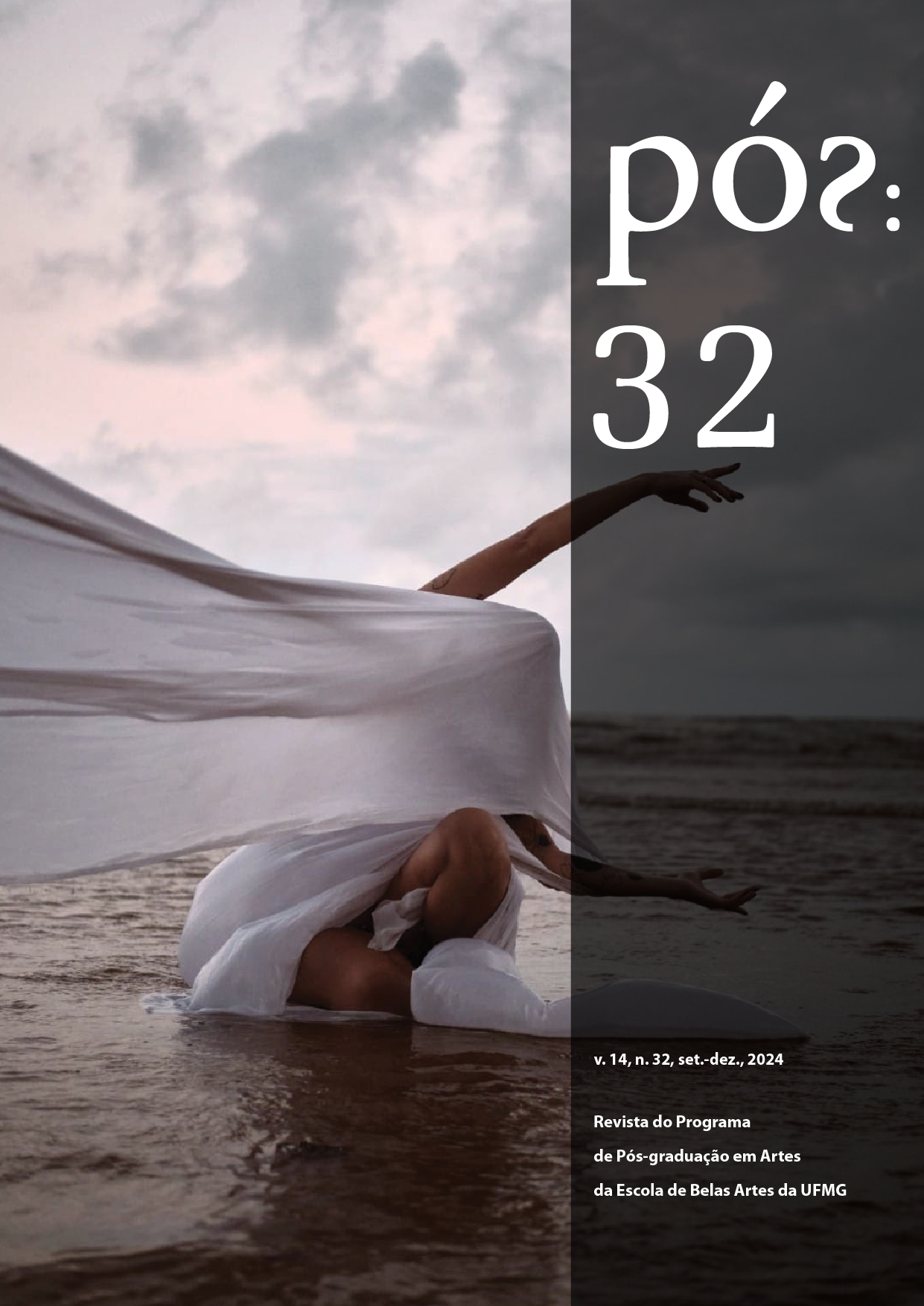Within Objects and Gestures, the Aesthetics of the Vulgar
DOI:
https://doi.org/10.35699/2238-2046.2024.52667Keywords:
Vulgar, Deconstruction, Situation, Counter-hegemony, philosophical aestheticsAbstract
This paper considers the vulgar as a radical aesthetic experience in contemporary times. The objective is to question the aesthetic and political hegemony that oppresses diversities. To legitimize everyday vulgarity, the argument mobilizes Walter Benjamin’s concept of “profane illumination”, Mikhail Bakhtin's “grotesque realism”, and Susan Sontag's “camp”. As a method, the text critically analyzes Ventura Profana’s work “Tabernáculo da Edificação”. The results show that transforming materialities through performance creates a situation that challenges traditional binaries, such as subject and object, artist and audience, beauty and grotesque, function and form, and sacred and profane. The vulgar reveals itself as a deconstructive strategy that promotes resistance and revolution against hegemony.
References
BAKHTIN, Mikhail. Rabelais and His World. Trad. Helene Iswolsky. Bloomington: Indiana University
Press, 1984.
BENJAMIN, Walter. O surrealismo. In: BENJAMIN, Walter. Magia e técnica, arte e política: ensaios
sobre literatura e história da cultura. Trad. Sérgio Paulo Rouanet. 3. ed. São Paulo: Brasiliense, 1987.
p. 21-35. (Obras escolhidas, 1).
BUTLER, Judith. Bodies that Matter: On the Discursive Limits of “Sex”. New York/London: Routledge,
BUTLER, Judith; LACLAU, Ernesto; ŽIZEK, Slavoj. Contingency, Hegemony, Universality:
Contemporary Dialogues on the Left. London/New York: Verso, 2000. (Radical Thinkers).
CASTRO, Laura Fonseca de. Deslegitimar, atualizar, vulgarizar: o desvio como método de
transformação material, narrativa e performática de espacialidades urbanas. 2021. 206 f. Tese
(Doutorado em Arquitetura e Urbanismo) – Escola de Arquitetura, Universidade Federal de Minas
Gerais, Belo Horizonte, 2021.
DEBORD, Guy. Rapport sur la construction des situations et sur les conditions de l’organisation et de
l’action de la tendance situationniste internationale. Inter: art actuel, n. 44, supplément, p. 1-11,
été 1989.
DRUSHEL, Bruce E.; PETERS, Brian M. (ed.). Sontag and the Camp Aesthetic: Dvanving New
Perspectives. New York/London: Lexington, 2017.
DUARTE, Rodrigo (org.). O belo autônomo: textos clássicos de estética. 2. ed. São Paulo: Crisálida;
Belo Horizonte: Autêntica, 2012. (Coleção FILOestética).
JA.CA: Centro de Arte e Tecnologia. Ventura Profana (BR). Bolsa Pampulha 2018/2019 – Pesquisa.
Disponível em: http://www.jaca.center/ventura-profana-br/ . Acesso em: 15 mai. 2024.
KLEINHANS, Chuck. Taking Out the Trash: Camp and the Politics of Parody. In: MEYER, Moe (ed.).
The Politics and Poetics of Camp. New York/London: Routledge, 1994. p. 182-201.
LEFEBVRE, Henri. The Production of Space. Trad. Donald Nicholson-Smith. 25th ed. Oxford:
Blackwell, 2007.
LÖWY, Michael. A estrela da manhã: Surrealismo e Marxismo. Trad. Eliana Aguiar. 2. ed. São Paulo:
Boitempo, 2018.
MENESES, Ramiro Délio Borges de. A Desconstrução em Jacques Derrida: o que é e o que não é pela
estratégia. Universitas Philosophica, Bogotá, v. 30, n. 60, p. 177-204, jan. 2013.
PODESTÁ, Sylvio Emrich de. Da série “A” de Cassino ao Museu de Arte da Pampulha: de Juscelino a
Priscila/Nemmer. Arquitextos, São Paulo, ano 1, n. 009.01, fev. 2001. Disponível em:
https://vitruvius.com.br/revistas/read/arquitextos/01.009/915 . Acesso em: 19 maio 2024.
PROFANA, Ventura. Profecia de vida. Piseagrama, Belo Horizonte, n. 14, p. 54-63, 2020. Disponível em:
https://piseagrama.org/profecia-de-vida/ . Acesso em: 19 maio 2024.
RESPLANDESCENTE. Produção: Podeserdesligado. Composição e interpretação: Ventura Profana.
São Paulo: Tratore e The Orchard Enterprises, 2019. Vídeo digital (5 min.). Disponível em:
https://youtu.be/H7mtc8IB_Ms?si=UsMQmpJXdI0UHkix . Acesso em: 15 maio 2024.
RICHARDSON, John Adkins. Dada, Camp, and the Mode Called Pop. The Journal of Aesthetics and
Art Criticism, v. 24, n. 4, p. 549-558, Summer 1966.
SENNET, Richard. The Uses of Disorder: Personal Identity and City Life. New York: Alfred A. Knopf,
Paginação irregular.
SONTAG, Susan. Against Interpretation and Other Essays. London: Picador, 2013.
TRAQUEJOS Pentecostais para Matar o Senhor. Produção: Podeserdesligado. Composição e
interpretação: Ventura Profana. São Paulo: Tratore, 2020. Álbum visual digital, 6 músicas e videoclipes
(23 min). Disponível em: https://youtube.com/playlist?
list=OLAK5uy_n1tY3Cz1XtLS5FspR0RBjNs_b7ea_X-pE&si=yxrZbRkq4dFaLb0h . Acesso em: 15 maio
WARK, McKenzie. The Beach Beneath the Street. London/New York: Verso, 2011.
WARK, McKenzie. Capital is Dead. London/New York: Verso, 2019.
Downloads
Published
How to Cite
Issue
Section
License
Copyright (c) 2024 Laura Castro

This work is licensed under a Creative Commons Attribution-NonCommercial 4.0 International License.
Authors who publish in this journal agree to the following terms:
- Authors retain copyright and grant the journal the right of first publication, with the work simultaneously licensed under the a Creative Commons Attribution-NonCommercial 4.0 International License that permits sharing of the work with acknowledgement of authorship and initial publication in this journal;
- Authors are permitted to enter into additional contracts separately, for non-exclusive distribution of the version of the work published in this journal (e.g., the Creative Commons Attribution License).
- Authors are permitted and encouraged to publish and distribute their work online (e.g., in institutional repositories or on their home page) at any point before or during the editorial process, as this may generate productive changes as well as increase the impact and citation of the published work.
- It is the responsibility of the authors to obtain written permission to use in their articles materials protected by copyright law. Revista PÓS is not responsible for copyright breaches made by its contributors.
Funding data
-
Coordenação de Aperfeiçoamento de Pessoal de Nível Superior
Grant numbers 001












